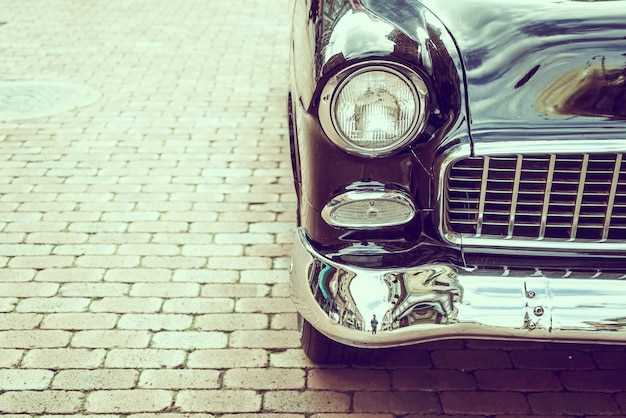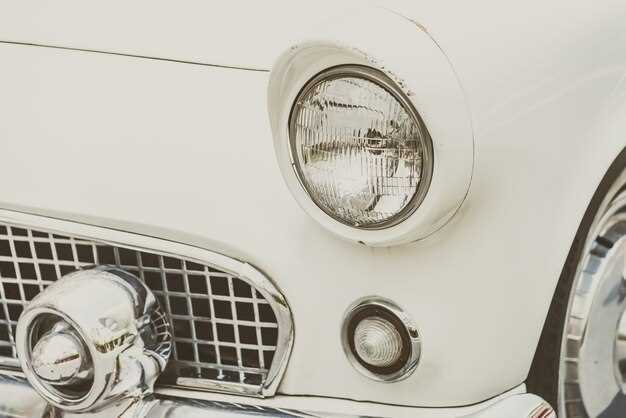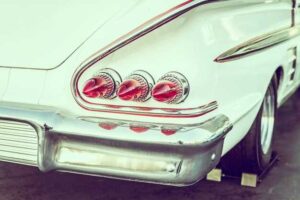Prioritize the car’s condition, focusing on both mechanical and aesthetic aspects. Examine the body, engine, and interior for wear and rust. A thorough inspection often uncovers hidden issues that can lead to costly repairs down the road. Hire a qualified mechanic if necessary, as their expertise can save you from potential pitfalls.
Research the model you’re considering. Understand its history, availability of replacement parts, and common problems associated with that particular make and model. Some classic cars are more reliable and easier to maintain, making them better investments.
Verify the vehicle’s provenance. Check for authenticity in documents and ensure that the car’s history aligns with its current state. A well-documented vehicle not only boosts value but also provides peace of mind regarding its past. Always ask about the previous owners and any major repairs undertaken.
Consider your budget beyond just the purchase price. Factor in insurance, maintenance, and restoration costs. Classic cars can require more upkeep than modern vehicles, so ensure you are financially prepared for potential expenses to maintain the vehicle’s beauty and function.
Assessing the Vehicle’s Condition and History
Inspect the classic car thoroughly to identify any mechanical issues or signs of wear. Check the body for rust, dents, and paint inconsistencies. Pay close attention to the undercarriage, as this area often shows the most significant signs of corrosion. Rust can compromise the structural integrity and lead to costly repairs.
Examine the engine compartment for leaks and signs of improper maintenance. Assess fluid levels, check the condition of belts and hoses, and listen for unusual sounds when starting the engine. Take the car for a test drive to evaluate handling, braking, and acceleration. Listen for noises that may indicate problems.
Request the vehicle’s history report. This document can reveal vital information such as previous accidents, odometer discrepancies, and whether the car has a clean title. Look for details on ownership history and service records that show regular maintenance. A well-documented history adds value and confidence in the purchase.
Utilize a classic car expert for a professional inspection. They can provide insights beyond the typical buyer’s knowledge, identifying potential issues and offering repair estimates. This step can save money and heartache in the long run.
Evaluate the originality of the parts. A car with its original components generally holds more value compared to one with extensive modifications. Verify that aftermarket parts do not compromise the vehicle’s authenticity and performance.
- Check for matching VIN numbers on the frame and engine.
- Investigate if the vehicle still has its original paint and interior.
- Confirm the originality of critical parts like the engine and transmission.
Finally, don’t overlook the importance of documentation. Maintain all service records, registration documents, and any correspondence with previous owners. This information will be helpful for future sales and repairs. Being thorough in assessing the car’s condition and history empowers you to make an informed purchase decision.
Determining Your Budget and Financing Options
Define a clear budget before exploring classic cars. Consider not only the purchase price but also ongoing costs such as maintenance, insurance, and storage. Set aside funds for potential restoration work, as many classic cars may require updates.
Start by assessing your available savings. Determine a comfortable amount you can allocate without straining finances. If you aim to finance the purchase, investigate various loan options from banks, credit unions, or specialized lenders. Compare interest rates and terms to find favorable conditions.
Consider the down payment. A larger down payment can reduce your monthly payments and overall interest costs. Aim for at least 20% of the car’s value to better your financing terms.
- Research classic car insurance quotes early. Premiums vary considerably based on the car’s age, rarity, and your driving history.
- Explore collector car insurance. This often provides coverage tailored for classic vehicles at more reasonable rates.
- Account for storage costs. Depending on your situation, you might need a garage or a dedicated storage facility.
- Factor in maintenance. Older vehicles may require specialized parts and labor, so create a reserve fund for upkeep.
When evaluating a purchase, inspect the car’s condition thoroughly. A well-maintained vehicle can save you money long-term, while a fixer-upper might require considerable investment upfront.
Lastly, don’t forget about market fluctuations. Research recent sales for similar models to gauge their current value, which helps in negotiation and ensures you’re making a sound investment.
Understanding the Market Value and Trends
Research recent sale prices of classic cars to gauge current market values accurately. Websites like Hemmings or Bring a Trailer provide valuable data on auction results and private sales. Track prices over the last few years to observe trends and determine if specific models appreciate or depreciate.
Consider the rarity of the model you’re eyeing. Limited production numbers often lead to higher values. Special editions, like the Shelby Mustang or Porsche 911 Turbo, tend to maintain or increase in price due to demand among collectors. Consult classified ads and online marketplaces for insights into how often specific models are listed and sold.
Look at which models are trending at car shows or enthusiast gatherings. Active communities often highlight popular models, signaling strong interest. Engaging with forums or social media groups helps you stay informed about emerging trends and potential investments.
Condition and documentation play a critical role in market value. Cars with original parts, full service histories, and verified mileage command higher prices. When assessing a car, request maintenance records and any restoration documentation. This can influence your purchase decision significantly.
| Model | Average Price (Recent Sales) | Market Trend |
|---|---|---|
| Ford Mustang Boss 302 | $50,000 | Increasing |
| Chevrolet Corvette (C3) | $35,000 | Stable |
| Porsche 911 (964) | $60,000 | Rising |
| Datsun 240Z | $25,000 | Increasing |
Stay updated with automotive news outlets and publications to track changes in market interest and values. National events, economic factors, and shifts in collector demographics can all impact prices significantly.
Engage with dealerships specializing in classic cars. Their expertise can guide you to valuable insights about the market and emerging trends, helping you make informed decisions in your purchasing journey.
Evaluating Maintenance and Restoration Costs
Research average maintenance costs specific to the classic car model you’re considering. Parts availability significantly impacts expenses. Some models have widespread support, while others may require sourcing rare components, raising prices dramatically.
Connect with local car clubs or online forums to gather insights from current owners. They can share firsthand experiences on long-term costs and maintenance challenges. This community can also offer tips on reliable mechanics who specialize in classic cars.
Determine how much restoration work the vehicle may require. Every classic car will need occasional repairs, but assess the extent of work necessary. A car with good maintenance history may only need routine service, while a project car can demand extensive and costly renovations. Obtain a detailed inspection report to identify potential red flags.
Factor in ongoing expenses such as insurance, storage, and occasional mechanical checks. Contact multiple insurance providers to get quotes tailored for classic cars. Consider climate-controlled storage options to preserve your investment, as this could save you money on repairs in the long run.
Keep a budget for unexpected repairs. Even well-maintained cars can surprise new owners with hidden issues. Allocating a reserve fund will ease the burden when repairs arise. Ensure the funds are distinct from your initial purchase budget to avoid mistakes in financial planning.
Researching Ownership and Insurance Considerations
Begin by confirming the car’s ownership history. Request documentation that verifies previous owners and any transfer of titles. Major shows or auctions often have detailed history for classic cars, so investigate these resources for a thorough background check.
Next, examine the car’s documentation for maintenance records. Well-kept service logs indicate diligent care and can enhance the vehicle’s value. Look for repairs, restorations, and any significant modifications that could influence insurance rates.
Insurance for classic cars differs from standard vehicles. Seek out insurers specializing in classic or vintage cars, as they offer coverage tailored to their unique needs. Compare policy options regarding agreed value versus actual cash value. Agreed value provides better protection since it ensures you receive the car’s full insured value in the event of a loss.
Consider mileage limits imposed by insurers and how usage patterns might affect premiums. Some policies also mandate regular appraisals for cars over a certain value. Make sure to understand the stipulations of any policy before purchasing.
Review the potential for collector car liability coverage, which can protect against accidents or damages. Understanding your responsibilities as an owner, including liability for passengers and other drivers, balances your protection with financial risk.
Lastly, reach out to veteran classic car enthusiasts and clubs. Members often share insights about trustworthy insurance providers and ownership pitfalls. Utilize their experiences to bolster your own decision-making process.
Finding a Trustworthy Seller or Auction
Verify the credentials of sellers by looking for established dealerships specializing in classic cars. Research customer reviews and ratings to gauge their reliability and customer service history. Ask for references from previous buyers; a reputable seller should provide them readily.
Attend classic car shows and auctions to meet sellers in person. This helps establish rapport and allows you to assess the cars up close. Pay attention to sellers’ responses about the cars’ history and condition. Honest sellers are transparent about previous repairs, modifications, and any known issues.
Check auction house reputations before participating in any sales. Look for houses with a history of classic car auctions and check their terms and conditions. A trustworthy auction house will conduct thorough inspections and provide detailed vehicle reports.
Request a vehicle history report from sellers and auction houses. This report reveals past ownership, accident history, and title information, helping you make informed decisions. It’s a red flag if a seller hesitates to provide this information.
Consider joining classic car clubs or online forums. Engaging with other enthusiasts can lead to recommendations for trustworthy sellers and auctions. Members often share their experiences and insights that can help guide your choices.
Always trust your instincts. If something feels off during negotiations or if the seller seems evasive, walk away. The classic car community values honesty, and you deserve a seller who reflects that commitment. Taking these steps will increase your chances of finding a great classic car without unnecessary risks.






